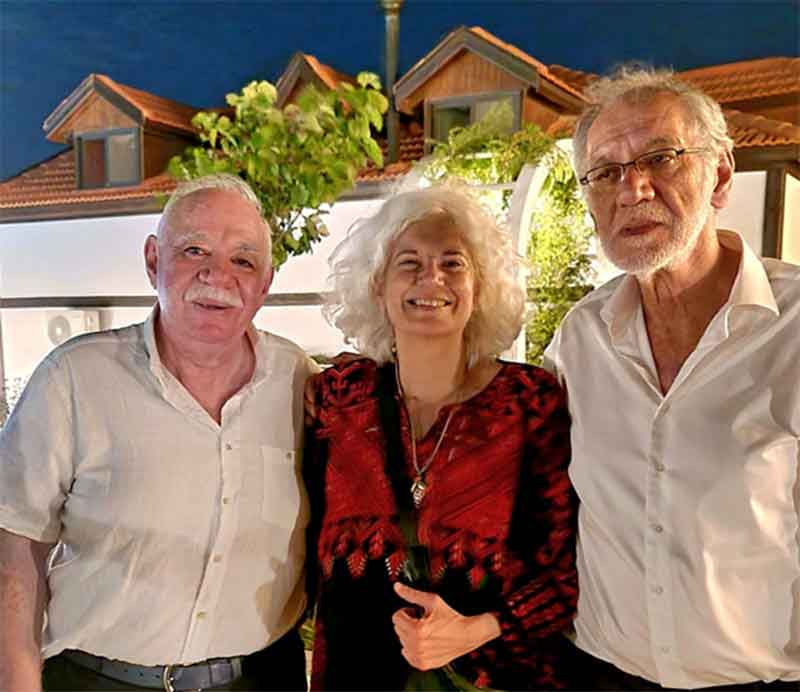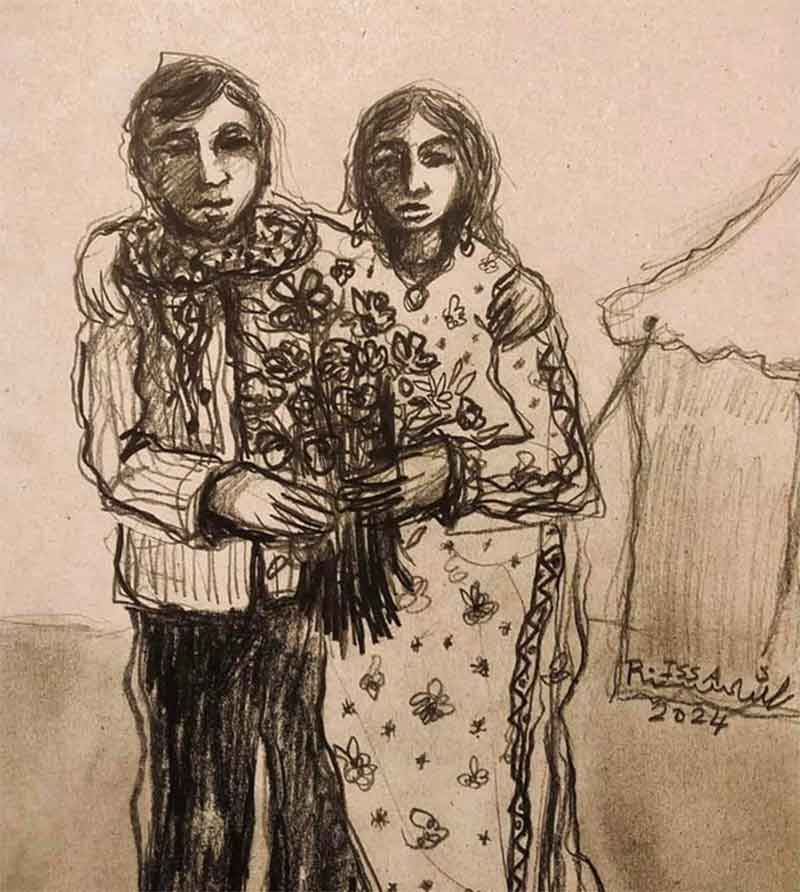
Caption: My Facebook post on June 21, 2024 with the caption, “Gazans (my cousins of the Bseiso family) celebrating a wedding in Jordan at a site overlooking Palestine.”
You would think that my announcement on Facebook of my Gazan cousin’s wedding in Jordan were an invitation to a wake in hateful memory of Israel. Zionist trolls who swarm every such Palestinian affirmation of identity reared their ugly heads to spin their narratives of erasure and sow discord.
Palestinian weddings have long represented resilience. They take on deeper significance during times of war; they celebrate traditions and reinforce bonds; they provide emotional support and foster community bonds; they celebrate life despite adversity and symbolize unity and hope for a better future.
On June 21, 2024, I posted my photo at a wedding with my Gazan cousins on Facebook. The caption read, “Gazans (my cousins of the Bseiso family) celebrating a wedding in Jordan at a site overlooking Palestine.”
Zionist trolls used this post as an opportunity to question the family’s Palestinian identity (“Bseiso family from Aleppo, Syria who migrated two centuries ago to the land of Israel”) and to express their views that Jordan is Palestine and, by implication therefore, that there was no need for Palestinians to assert their right to self-determination and sovereignty in their ancestral homeland:
– “The Hashemit Kingdom of Jordan is in Palestine! PALESTINE is not a State or country, but a Region, just like the Balkan or Kavkaz!”
– “They are in Jordan ! So this is their real place !!!!:!!”
– “Mais la Jordanie c’est la Palestine arabo musulmane ! Et sur 80% de la région de Palestine , presque tout le territoire . Qu’est ce qu’ils ont encore à regarder de plus?” [But Jordan is Arab-Muslim Palestine! And on 80% of the region of Palestine, almost the entire territory. What more do they have to watch?]
– “Er…Jordan is in Palestine!🤦”
By describing Jordan as “in Palestine,” the trolls obfuscate history to stir up trouble and create divisions. Jordan’s monarchy has faced challenges in balancing Palestinian interests while maintaining stability and it is this delicate stability that Israel and these trolls want to injure. The geopolitical border described in the rallying cry “from the river to the sea” includes only the West Bank of the Jordan River, not the East.
Although there are historical and cultural connections between the areas west and east of the Jordan River, Transjordan was not considered part of Palestine in a strict geopolitical sense during the Ottoman period or under the British Mandate after 1921, when international boundaries between Palestine and Transjordan were established. At the time, the Sykes-Picot Agreement and the Balfour Declaration produced a recipe for disastrous instability in the southern part of Greater Syria, namely, two countries (Palestine and Transjordan) for three peoples — Palestinians, Transjordanians, and a growing Jewish Zionist colonists from Europe in Palestine.
The establishment of the Hashemite Kingdom of Jordan has provided continuity and a degree of stability in the region (Hashemites hold a special role as custodians of the Muslim holy sites in Jerusalem), but the monarchy has never resolved the underlying conflict between Zionists and Palestinians in the region, preferring instead to co-operate with the US and buy into its illusory and deceptive “peace process.”
Jordan has supported Palestinian rights and provided refuge and integration for many Palestinians. It has consistently advocated for a two-state solution and the rights of Palestinians on international platforms. This advocacy has helped keep the Palestinian cause in the international spotlight. However, Jordan has also acted to preserve its own authority, sometimes at the expense of Palestinian nationalist aspirations. Its actions have not always aligned perfectly with Palestinian nationalist goals. And although today, in the aftermath of Oct 7, public opinion in Jordan is swinging firmly against normalization with Israel, concerns about stability and security remain paramount for Jordanians.
After World War I, the League of Nations granted Britain the mandate for Palestine in 1920. Initially, this mandate included the territory east of the Jordan River. However, the British had different administrative plans for these regions. In 1921, the British decided to separate the territory east of the Jordan River from the Mandate for Palestine, creating the Emirate of Transjordan. Abdullah I of the Hashemite family was installed as the emir. This effectively created a distinct administrative entity, although both were under British control.
The establishment of Transjordan as a separate administrative unit in 1921 meant that it was no longer considered part of Palestine in a political or administrative sense. By 1923, this separation was formalized, but the British government often treated them as two complementary entities —for example, the Palestinian currency was also the official currency of Transjordan; Palestinian civil servants were seconded to the administration in Transjordan, and Palestine supported the Transjordanian budget both directly and indirectly. Both regions, after all, were administered by the same Mandate. The British resident in Amman operated under the directives of the high commissioner in Palestine and Palestinian officials were usually appointed to the administration of Transjordan as well.
As a result of the subsequent partitioning of Palestine and the violent creation of the settler-colonial Zionist Jewish state on 78 percent of Palestinian territory, antagonism toward Israel and support for Palestine remain deeply ingrained in the political culture and national consciousness of Arab and Muslim nations.
My friend Max Monclair expressed it perfectly: “The only reason Jordan isn’t ‘in Palestine’ is because of the British. No one living in Palestine decided on any of this. The trolls need to learn history or be honest that they are defending the self-claimed ‘right’ of the West to determine the shape of the rest of the world.”
Just as the Zionist movement and the presence of US-backed Israel in the region has significantly influenced Jordan’s history, politics, and stability, it has also had significant negative and dramatic impact on the stability of several other Middle Eastern countries, ranging from territorial disputes to broader geopolitical tensions. The unresolved tensions of the past in Palestine continue to shape the politics of the region today.
Following is a cursory rundown of these scenarios:
Egypt: Israel’s aggression on Palestinians, especially in Gaza, continues to pose immediate threats to Egypt, including potential refugee influx, internal instability, and sharp reductions in state revenues that undermine Egypt’s economic and national security.
Iraq: The Zionist movement played a role in the 1950s attacks on Iraqi Jews, leading to tensions and displacement. It intensified competition between superpowers (the United States and the Soviet Union) in the region, affecting Iraq’s stability.
Lebanon: The 1982 Lebanon War, initiated by Israel, had a profound impact on Lebanon’s stability. Israel’s invasion aimed to weaken Palestinian and Syrian influence but resulted in significant casualties and displacement. The concept of “Greater Israel” also included parts of Lebanon, further contributing to regional tensions.
Syria: The 1967 War led to Israel capturing the Golan Heights from Syria, escalating tensions and affecting regional stability. The uprooting, dispossession of Palestinians influenced Syria’s domestic and foreign policies, contributing to instability.
Yemen: Israel’s actions and their consequences in the region shaped the Houthi worldview regarding the Zionist-American aggression. while Yemen faces internal strife, the Houthi movement’s alignment with Palestine underscores the broader geopolitical contest in the Middle East.
Sudan: The Israeli-Palestinian conflict impacted Sudan’s security and relations with power dynamics in the Middle East, indirectly affecting its stability.
As I wrote here: “Much of the world is finally realizing that Zionism and Israel are not just problems, but everybody’s problems.”
Subscribe to Our Newsletter
Get the latest CounterCurrents updates delivered straight to your inbox.
Long before Oct 7 and the Al-Aqsa Flood, there was Al-Buraq Revolution of 1929, the first Palestinian uprising against attempts to Judaize Jerusalem during the British Mandate era. Al-Buraq Wall is the western wall of Al-Aqsa Mosque. Muhammad Jamjoum, Fouad Hijazi, and Atta al-Zeer were Palestinian revolutionaries executed by the British Mandate in 1930 for their role in the Al-Buraq Revolution. These three individuals became enduring symbols of Palestinian resistance and struggle. Mirror of the East (جريدة مرآة الشرق) Newspaper reported the following on June 21, 1930:
“This is my wedding day, ma, so rejoice
When the mother of the martyr Muhammad Jamjoom went to visit him in prison, he saw her crying and said to her, ‘This is my wedding day, my mother, so ululate’ and the martyr Atta al-Zeer told his sisters, ‘Do not think that I am dead, I am alive, so do not cry for me.’
Those sentenced to death Fouad, Atta and Mohamed continued to sing national anthems until the last hour.”

Caption: “In the refugee camps, there was joy: A wedding in a tent” by Raed Issa
By comparing his martyrdom to a wedding, Muhammad Jamjoum invoked the idea of Palestinian weddings as powerful expressions of resilience, love, and continuity.
Palestinians carry a profound mix of emotions when it comes to the martyrdom of their sons. Along with immense grief and pain, they feel a deep sense of national pride. They regard martyrdom as a worthy sacrifice in defense of their homeland and resistance to occupation, colonization, and injustice — a path to paradise and divine reward. To Palestinians, “Peace be upon you السلام عليكم” means liberation, equality, and justice.
Note: First published on Medium here.
___________________
Rima Najjar is a Palestinian whose father’s side of the family comes from the forcibly depopulated village of Lifta on the western outskirts of Jerusalem and whose mother’s side of the family is from Ijzim, south of Haifa. She is an activist, researcher, and retired professor of English literature, Al-Quds University, occupied West Bank.









































